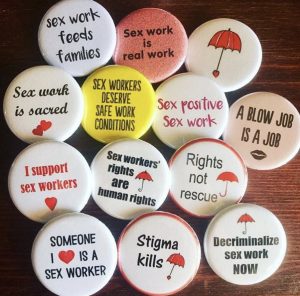 (Lux Alptraum) – “No little girl grows up wanting to be a prostitute,” declares the homepage of the No Little Girl campaign, a recently launched attempt to criminalize sex work in two of the seven Nevada counties where it’s currently legal.
(Lux Alptraum) – “No little girl grows up wanting to be a prostitute,” declares the homepage of the No Little Girl campaign, a recently launched attempt to criminalize sex work in two of the seven Nevada counties where it’s currently legal.
Next to the tagline is a photo of an angry little girl blowing a whistle; the campaign’s literature is filled with story after story of the kind of violence and exploitation that this young girl is presumably blowing the whistle on. “Prostitution can’t be made ‘a little better’ any more than domestic violence can be made ‘a little better,’” the campaign’s FAQ argues, couching sex work itself as a fundamentally exploitative industry in which women are preyed on and trapped.
Yet for actual sex workers, the workplace described by No Little Girl bears little to no resemblance to the brothels they earn a living in. Rather than feeling exploited, abused, and assaulted, many workers describe the brothels as paths to economic freedom. “Since starting my career as a legal prostitute in Nevada, I can truthfully say it was one of the best decisions I have made,” writes brothel worker Ruby Rae in an opinion piece in the Nevada Independent, urging readers to oppose any attempts to roll back sex work legalization in Nevada.
No Little Girl is currently collecting signatures to get its anti-sex work initiatives on the November ballots. When I spoke with Jason D. Guinasso, a Reno lawyer working on the campaign, he told me that each petition had attracted a little more than 1,000 signatures. If the campaign collects a few thousand more, the petitions will be sent to their respective county commissions, who will either choose to act on them or turn the issue over to county voters this November — the counties on the ballot house many of the state’s brothels, meaning a successful referendum would eliminate half of Nevada’s legal brothels. The group could take its campaign to the statewide level if successful.
For many people, the world of sex work is a completely foreign one, something you only see in salacious movies or alarmist documentaries. When your only contact with sex workers is as the butt of a joke or subject of a tragic story, it’s easy to buy into narratives like No Little Girl’s.
But as someone who has known many sex workers, both personally and professionally — I am a former editor of the sex industry-focused blog Fleshbot — it’s easy to see the vast gap between the reality of sex workers’ lives and the bleak fiction peddled by the anti-sex work industry. While not all sex workers are as effusive about their work as Ruby Rae, few identify with the exploited women put forth by campaigns like No Little Girl. Doing a little digging into the broad claims put forth by this campaign quickly reveals how baseless they actually are.
The war on sex work continues on multiple fronts. Anti-sex trafficking groups successfully lobbied to pass the Fight Online Sex Trafficking Act and the Stop Enabling Sex Traffickers Act, or FOSTA-SESTA, laws that hurt sex traffickers online by holding platforms responsible for content that promotes sex work. In theory, FOSTA-SESTA helps the government hold websites accountable for providing safe havens for sex traffickers; in practice, the law has led platforms across the internet to crack down on anything even remotely related to sex work (and sometimes even just sex), eradicating message boards and resources that sex workers use to screen clients, share safety tips, and get out of unsafe and nonconsensual sex work situations.
But No Little Girl has now set its sights on eliminating one of the few forms of legal sex work in the United States. All in all, it’s a dark time for sex workers fighting for the legal recognition that would actually reduce exploitation.
The attack on legal sex work in Nevada is based on bad data
The No Little Girl campaign has argued that Nevada’s brothels have a negative effect on the state. In reality, research shows that the lives of Nevada citizens have improved due to the legalization of sex work in the state. Nevada’s system isn’t perfect — but it’s a considerable improvement over the national policy of criminalization.
No Little Girl has three major arguments for shutting down the legal brothel industry: Brothels do not significantly contribute to their counties’ economies while deterring other businesses from setting up shop; they increase violence against women who don’t work in the sex industry; and they’re inherently abusive (because, as the campaign’s tagline reminds visitors, “no little girl grows up wanting to be a prostitute”).
At first glance, these arguments may seem sound. But combing through the data — even the data the organization links to on its site — suggests that many of No Little Girl’s claims are exaggerated at best and misleading at worst.
For starters, No Little Girl neglects to discuss the financial impact of the jobs these brothels create in its reports, as well as the tourism they bring to their respective counties. (Dennis Hof, owner of many prominent brothels in Lyon County, estimates that between taxes, fees, and tourism, the brothels contribute $10 million to the local economy.) County officials have repeatedly gone on record to talk about the business opportunities brothels bring to counties that would likely be economically depressed without them.
Even more misleading are No Little Girl’s charges that legal sex work makes a woman 26 times (or, as another statistic claims, 1,660 percent) more likely to be sexually assaulted than women in neighboring counties. While these stats are based on real FBI crime statistics, they only take into account a few years of data in just two Nevada counties. A broad look across all of Nevada — including counties with legal sex work where assault rates are low — show no correlation between assaults and the presence or absence of legal sex work.
Meanwhile, a number of studies of countries where sex work is legal have routinely found that legalization or decriminalization of sex work is often correlated with lower rates of sexual assault. When Rhode Island accidentally legalized indoor prostitution (a rewrite of its overly broad prostitution laws wound up deleting the language making it illegal) for a number of years, reported rapes declined by 31 percent after; when the Netherlands opened “tippelzones,” or areas where street prostitution is legal, reports of rape and sexual abuse declined by a similar percentage over the first two years.
This decline could be attributed to a number of other factors — including country culture or other laws related to sexual assault — but it’s worth noting.
But it’s No Little Girl’s comments on the safety and working conditions of the brothels themselves that truly twist the facts. The campaign cites statistics about abuse, assault, and PTSD from Melissa Farley, a researcher whose credibility has been called into question. Critics have noted that, among other things, Farley frequently presents misleading anecdotes and statistics — like a claim that street-based sex work increased 400 percent in Auckland after decriminalization — as fact.
Christina Parreira, a University of Nevada Las Vegas PhD candidate who’s researched the experiences of Nevada sex workers and is a brothel worker herself, tells me that No Little Girl’s description of working in the brothels is “not accurate at all.” Contrary to the campaign’s depiction of Nevada sex workers as broken and abused, Parreira says she has “a great life. I don’t come from an abusive family. … It’s so insulting for other women to tell me that [I don’t know what I want].”
Nevada’s laws aren’t perfect, but they are far better than the national policy
None of this is to say that a legalized brothel system is perfect or above reproach. Nevada’s regulations dramatically limit who can participate in the legal sex work system — if a brothel doesn’t hire you, you can’t work legally. Since few brothels are interested in hiring men or trans women, the system is effectively closed off to those groups. Additionally, some of the expenses and registration requirements can feel punitive and off-putting, making it harder for the most vulnerable women to work safely and legally within the system.
It’s these types of restrictions that have led many human rights organizations, including Amnesty International, to argue that sex work decriminalization — or the removal of criminal penalties for sex work, without additional regulation or restrictions on who can sell sex — is preferable to some legal sex work systems, such as those found in Nevada, Germany, Amsterdam, and Tunisia.
Yet in spite of its flaws, the Nevada brothel system is still leaps and bounds ahead of the criminal penalties most of the country imposes on all people who choose to exchange sex for money. Rather than rolling back the progress Nevada has achieved, we should be looking to the state as an inspiration for pursuing even more progressive policies that empower and uplift people who choose sex work as an occupation.
But so long as we allow our arguments about sex work to be led by morality rather than harm reduction, we’ll continue to fall prey to the kind of knee-jerk anti-sex work zealotry displayed by No Little Girl. And our sex work policies — and the safety of sex workers — will continue to suffer as a result.
Truly understanding the lives of sex workers, and the policies that help them, requires putting aside our personal feelings about sexuality and listening to the experiences of sex workers. It requires recognizing that sex work is work, even if it’s work we’re not interested in or willing to do ourselves. It requires understanding that eliminating sex work is no more feasible than eliminating abortion — people will find a way — and that making sex work safer should be our collective goal.
When we can’t do that, we wind up with half-baked arguments about the evils of sex work and policies that, sadly, do more harm than good.
Lux Alptraum is a writer whose work has been featured in the New York Times, Men’s Health, Cosmopolitan, Hustler, and more. Her first book, Faking It: The Lies Women Tell About Sex — And The Truths They Reveal, comes out this November. This column was originally published at Vox.com on May 29, 2018

Leave A Comment